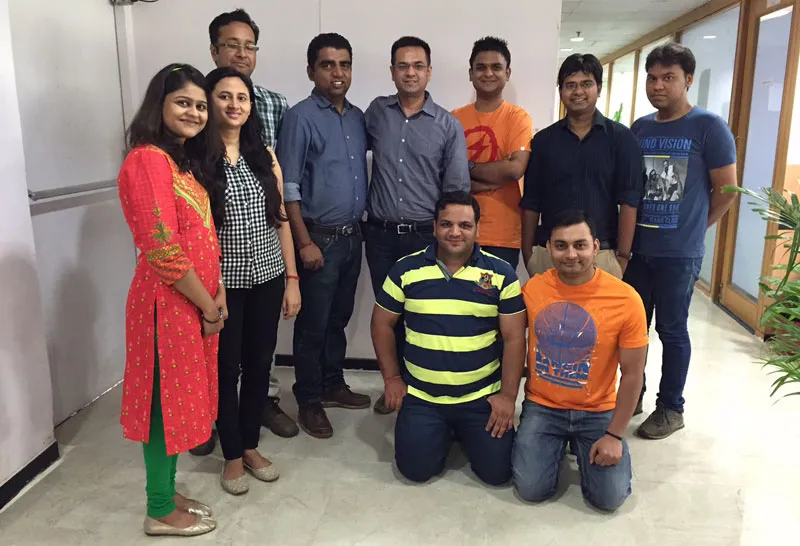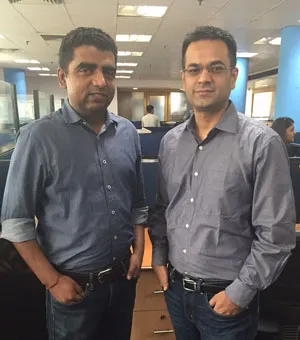Brokers collaborations platform BroEx looks to shake up the $4 billion brokerage market
Real estate brokers are a harried lot. In the cut-throat property market, they have to hunt down inventory, build contacts, collaborate with fellow agents, chase clients - often frustrated sellers and desperate buyers - and make a decent commission in the process. Buyers love to hate them, the legwork is exhausting and time-consuming, and clients and deals can often end up being unpleasant.
While looking for a rented house and dealing with various real estate brokers, Pallav Pandey, CEO of BroEx, noticed that the brokers needed to network with other agents on a real time basis. They not only needed quick access to inventory but also stay abreast of developments in the industry and maintain a trusted channel of communication.

He then hit upon the idea of a mobile app to make life easier for such agents, and co-founded BroEx (short for Broker Exchange) with Mukul Kumar in November, 2014-an aptly-named application that helps brokers find other trusted brokers with complimentary requirements and inventory, so that deals can be closed faster and customers can be served better.
“The idea behind BroEx is to empower brokers to collaborate among themselves using technology. They have been using basic tools like WhatsApp and Google Groups for some time but their requirements have far outgrown the utility offered by these. BroEx operates in that space - offering brokers a superior scalable product to help them reach farther, close faster,” says Pallav, whose product website claims “no more struggling with cumbersome WhatsApp groups.”
Early bird gets the worm
According to the founder, BroEx is the first and, by a large margin, the largest broker network in India, and is quite different from other similar platforms. The BroEx solution, unlike other online listing websites, focuses on and caters to brokers’ need to collaborate- one of the most fundamental requirements of the real estate segment- and attempts to organise the unstructured real estate market.
The CEO pegs the number of real estate brokers across the country at 5 lakhs. The app, which is available on Google’s Playstore and the iOS platform, already has 15,000 real estate agents registered on it.

When asked about the growth prospects in a market which faces severe competition, Pallav is confident: “For now, we are totally focused on establishing BroEx as the platform for broker collaboration. Once that is achieved, there are multiple possibilities about where we can go,” he says, putting the month-on-month growth in user downloads at about 100%
The app lists options such as “chat with the interested broker”, “get to know brokers beyond current circle”, “reference check from your close associates before dealing”, “list all your inventory in one place and keep it updated”, “know freshness of listing, avoid calling on stale postings” and “filter with options like vaastu, power backup, etc.”
Funding and Business Model
A self funded start-up, the initial investment in the business was Rs 1.2 crore, and much of it went into developing the product and bringing the core team together. The app is free for brokers - now and forever. However, in the future, BroEx plans to charge builders for pushing their inventory and information through the brokers. The brokerage market in India is estimated to be about $4 billion.
Additionally, multiple venture funds have shown strong interest in it. “We are raising a seed round from a leading investment fund,” reveals Pallav, who is an alumnus of IIT Kanpur.
Response and Challenges
BroEx has targeted the real estate broker community across India, and the response from the segment has been phenomenal. The Apps team has witnessed far greater downloads and adoption than what they had initially anticipated. They claim that that more than 15,000 brokers use the app currently, and the number is expected to double in a month!
On the challenges in the segment and overcoming them, the founder says,
We are in a business which has the classic network problem - if you do not have a minimum critical number of users, it does not make the product useful enough. Many companies who are trying this business are still stuck with 1,000-1,500 downloads, which makes it difficult for them to offer real value. Being early in the market, we have been able to tide over the challenge rather well.







